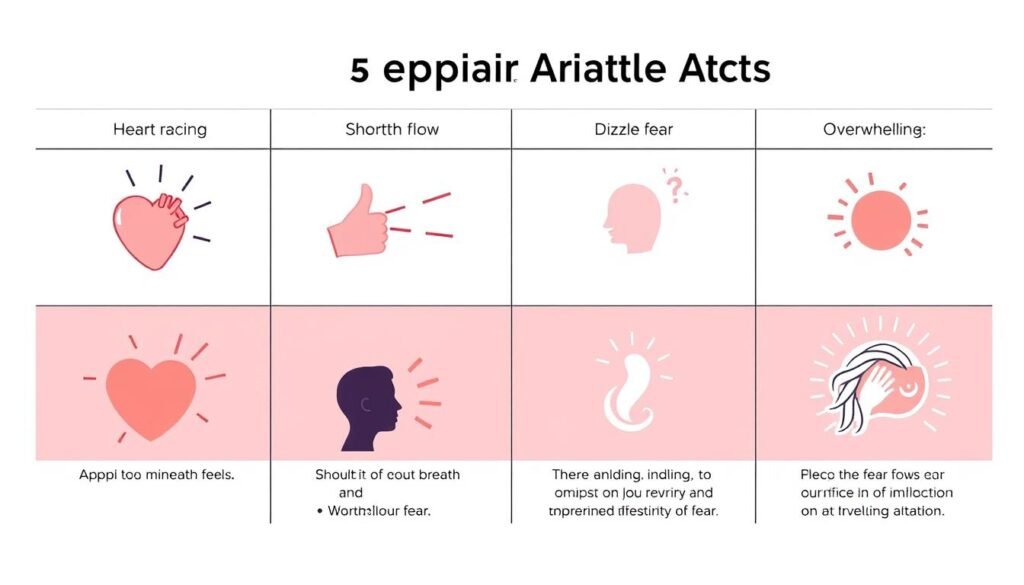Did you know nearly 30% of adults face anxiety disorders at some point? This shows how common these conditions are, highlighting the need for empathy and support.
Anxiety is something many feel from time to time. Yet, when it turns into a disorder, it disrupts lives. People with anxiety disorders face a lot of worry and fear over normal events. Disorders like generalized anxiety disorder and social anxiety lead to panic attacks. These attacks bring sudden, extreme terror.
It’s vital to understand these emotional symptoms if you’re dealing with anxiety disorders. Thankfully, many find relief through treatment, with therapy greatly reducing panic attacks in just a few sessions. Learning the right ways to cope can really help manage anxiety, making the path to emotional health smoother. For extra details, visit this resource on anxiety disorders.
Key Takeaways
- Anxiety disorders impact nearly 30% of adults in their lifetime.
- Common emotional symptoms include fear, worry, irritability, and panic attacks.
- Panic attacks can often be addressed effectively with therapy.
- Understanding emotional symptoms helps in seeking the right coping mechanisms.
- Awareness of different anxiety disorders can promote early intervention and support.
- Living with anxiety requires knowledge of emotional symptoms to foster better management.
- Seeking help early can significantly improve one’s quality of life.
Understanding Anxiety Disorders
Anxiety disorders are a group of mental health issues that impact people’s lives significantly. Nearly 1 in 5 American adults face anxiety disorders each year. This shows how common these conditions are. Specific phobias and generalized anxiety disorder (GAD) are two main types that affect how persons interact and feel.
About 7 million American adults struggle with generalized anxiety disorder. This condition causes constant worry about various life aspects. People with GAD often find daily tasks overwhelming. Meanwhile, specific phobias are intense fears triggered by certain things or situations, like spiders or heights. They affect 8% to 12% of adults.
It’s vital to recognize anxiety symptoms early to get help. These include feeling restless, having muscle tension, and trouble focusing. Anxiety can start early in life, affecting around 1 in 3 children. Intervening early is key since half of all mental health issues start by age 14. Proper treatment can improve future well-being.
By understanding anxiety disorders and their effects, we can support those in need better. Treatments like cognitive-behavioral therapy and medication can really help. They improve mental health and life quality for affected individuals.
What Are the Emotional Symptoms of Anxiety?
Emotional symptoms of anxiety cover a range of feelings that can really change how someone lives each day. Many deal with non-stop worry. This worry often comes from being very afraid or thinking about bad things a lot. This situation can make someone always be on edge and make it hard to control their thoughts. This can mess up both work and fun times.
Overview of Emotional Symptoms
Anxiety’s emotional side is tricky. People with anxiety often feel many emotions, like:
- Uncontrollable worry about daily things.
- Intense feelings of dread about what might happen.
- Episodes of fear that don’t match the actual situation.
- Frequent mood swings that affect how they get along with others.
- General worry that leads to feeling upset and irritable.
Common Feelings Associated with Anxiety
Anxiety often shows up as strong feelings that get in the way of living well. Common feelings are:
- A sudden sense of fear for no clear reason.
- Always worrying about different parts of life, like friendship, work, and health.
- Big mood swings caused by stress, which make emotions feel out of control.
- Feeling disconnected, which hurts someone’s social life and how they interact with others.
People with anxiety disorders find these emotions disrupt daily routines. This leaves them feeling alone and swamped. Knowing and accepting these emotions is an important part of dealing with mental health. Recognizing these signs is the first step towards coping and getting help.
The Role of Fear and Worry
Fear and worry greatly affect how we handle anxiety. Knowing these emotions helps in managing anxiety. Fear is often seen in daily life as avoiding things that make us anxious. Avoiding these things can change our lifestyle and make it hard to interact with others.
How Fear Manifests in Daily Life
Fear causes our body to ready itself for fight or flight. This includes a fast heartbeat, short breaths, and feeling sick. These signs might make it hard to tell fear from anxiety. Avoiding things that scare us can make anxiety worse over time.
The Impact of Worry on Mental Health
Too much worry can hurt both our minds and bodies, leading to headaches and stomach issues. It also makes us more easily upset and hard to focus. Worrying too much can keep us up at night and lower the quality of our lives. Getting help from professionals is key for those dealing with long-term worry. Ways to manage these feelings include working out, relaxing, and effective treatments like Cognitive Behavioral Therapy (CBT). For more tips on dealing with anxiety, check out MedlinePlus or Moodcare Health.
Irritability and Restlessness
Irritability and restlessness often go hand in hand with anxiety disorders. Knowing how anxiety is linked to these feelings helps us understand their impact. They can disrupt how we function every day and our relationships with others.
The Connection Between Anxiety and Irritability
Irritability is a common result of anxiety. Those with anxiety may feel more frustrated and angry. This can harm personal and work relationships. Anxiety’s weight can make coping harder, leading to stress and upset feelings.
How Restlessness Affects Daily Functioning
Restlessness, driven by anxiety, can significantly affect daily life. It often makes people want to keep moving. This can cause sleep problems, leaving them tired. Being so restless can make focusing hard and tasks more challenging.
It also makes socializing tough, possibly leading to feeling isolated. This is because restlessness makes it hard to relax and connect with others.

| Emotional Symptoms | Effects on Daily Life |
|---|---|
| Irritability | Strained relationships, difficulty in communication |
| Restlessness | Sleep disturbances, decreased productivity |
| Difficulty Concentrating | Poor performance in work/school, anxiety 강화 |
Understanding how irritability, restlessness, and anxiety interact is key. It helps us see the bigger picture of their effect on someone’s life.
Mood Swings and Emotional Distress
Mood swings are a key emotional sign linked with anxiety disorders. People may feel their emotions change quickly, causing confusion and distress. Anxiety greatly affects mood, with fear and worry making things worse. It is important to notice these patterns early on.
Understanding Mood Swings in Anxiety Disorders
Mood swings show as sudden emotional shifts that do not match what’s happening around. These changes are partly due to hormones and brain chemicals. For those with anxiety, dealing with mood swings is harder. This is because anxiety makes it tough to handle emotions. Stress or fear can make these swings more frequent.
Recognizing Signs of Emotional Distress
Spotting signs of emotional distress helps in dealing with anxiety’s effects. Key signs to watch for include:
- Fatigue
- Difficulty concentrating
- Crying spells
It’s crucial to pay attention to these symptoms and find ways to cope. If ignored, they can worsen anxiety and mood swings. Using self-help strategies, taking breaks, and other positive steps can help restore emotional steadiness.
Overwhelming Feelings: Breaking Down Panic Attacks
Panic attacks are extremely powerful and scary experiences. They involve sudden symptoms and mental changes. Recognizing these signs is key to handle anxiety well. When panic attacks strike, they bring strong physical and emotional reactions.
What Happens During a Panic Attack?
People facing a panic attack might see many symptoms appear:
- Rapid heartbeat
- Sweating
- Trembling or shaking
- Feelings of choking
- Shortness of breath
- Chest pain
- Nausea or abdominal distress
- Fear of losing control or “going crazy”
- Fear of dying
- Chills or hot flashes
- Feelings of unreality or detachment
These signs can pop up all of a sudden, mostly without any heads-up. This can cause a cycle of fear and worry about when the next attack will happen.
Long-Term Effects of Panic Attacks
Dealing with panic attacks over time can really change things for someone. If they keep happening, they can cause a lot of stress and fear. This might lead someone to stop doing things to avoid future attacks. Avoiding people or certain places might seem like the solution, but it can harm how someone lives.

| Symptom | Immediate Response | Long-Term Impact |
|---|---|---|
| Rapid heartbeat | Increased adrenaline | Heightened anxiety |
| Sweating | Cooling response | Social avoidance |
| Tremors | Muscle tension | Physical distress |
| Fear of dying | Fight or flight | Long-lasting dread |
Good coping strategies, like cognitive behavioral therapy or exposure therapy, can really make a difference. They let people take back their lives and lessen the effects of panic attacks. Medicine, like antidepressants or anti-anxiety drugs, can also help. But finding the best treatment can sometimes take a while. Knowing all about these options is essential for those dealing with these tough feelings.
Emotional Dysregulation and Its Effects
Emotional dysregulation often becomes a major issue for those with anxiety disorders. They may struggle to control their emotions, making them more sensitive to triggers. This can lead to intense feelings that affect daily life and mental health. Knowing how anxiety and emotional control are linked can help in finding ways to manage emotions.
How Anxiety Contributes to Emotional Dysregulation
Anxiety can make it hard to manage feelings, increasing emotional instability. Often, early childhood trauma is a key factor, setting the stage for emotional challenges later. Also, being constantly told your feelings don’t matter can worsen the problem. Disorders like PTSD and BPD show how anxiety relates to emotional difficulties.
Coping Mechanisms for Emotional Dysregulation
Finding the right coping strategies is vital for those struggling with emotional control due to anxiety. There are several ways to help, including:
- Mindfulness practices to focus on the present.
- Deep-breathing exercises for calming intense emotions.
- Talking therapies for expressing and validating feelings.
These methods aid in regaining emotional stability and being more resilient against anxiety. They improve how we handle our emotions, lessening anxiety’s impact on life. With practice, these skills can greatly enhance ability to manage anxiety, no matter the age.
| Coping Method | Benefits |
|---|---|
| Mindfulness | Boosts emotional awareness and lowers anxiety. |
| Deep Breathing | Eases emotional peaks and reduces stress. |
| Talking Therapies | Encourages understanding and sharing of emotions. |
Trying out proven strategies is crucial for dealing with emotional dysregulation. For more insight into the impact of emotional regulation on anxiety, check out this resource.
When to Seek Help for Anxiety Symptoms
It’s vital to know when to get help for anxiety. Signs like constant worry, being easily upset, and feeling hopeless show you might need support. Getting help early can lead to a quicker recovery. Don’t ignore these warning signs.
Signs You Need Professional Support
If you notice these symptoms, consider seeking help:
- Worrying too much about things like your health or money
- Often feeling restless or on edge
- Having trouble focusing or remembering things
- Experiencing panic attacks that last a few minutes
- Show physical signs, like a fast heartbeat or sweating a lot
Getting help early is key. You can start by checking out mental health services. For example, talking therapies, like CBT, are really helpful.
The Benefits of Early Intervention
Fast action can greatly improve dealing with anxiety. It helps you understand your feelings and find ways to cope before things get worse. CBT and other therapies can really reduce anxiety and make life better.
| Early Signs | Benefits of Seeking Help |
|---|---|
| Persistent worry | Reduces symptom severity |
| Physical manifestations | Improves coping mechanisms |
| Social withdrawal | Enhances interpersonal relationships |
| Irritability | Promotes emotional regulation |

Dealing with anxiety is different for everyone. Starting the process of seeking help can greatly help manage symptoms. This leads to better mental health overall.
Preventative Measures for Managing Anxiety
Taking action before anxiety sets in is key. Knowing how to change your lifestyle can make a big difference. Combining exercise and good eating habits is a solid base for tackling anxiety.
Strategies to Reduce Anxiety Symptoms
There are good ways to lessen anxiety. Doing at least 2.5 hours of exercise like walking each week helps. Or, you can choose activities like running or swimming for 1.25 hours a week.
Having a regular schedule of exercise, three to five times a week, is important. It’s better to be consistent than to expect perfection in every workout.
- Consider finding an exercise buddy to enhance motivation and adherence.
- Incorporate diaphragmatic breathing techniques to activate the parasympathetic nervous system, promoting relaxation.
- Utilize guided imagery and music to shift focus and elevate mood.
- Prioritize body awareness through simple stretches to alleviate tension.
Importance of Lifestyle Changes
Making changes in your life is crucial for managing anxiety. Getting enough sleep is important for your mind and emotions. It’s vital to stay away from things that can make anxiety worse, like alcohol and caffeine.
Choosing what to eat carefully, like a diet based on whole foods, helps your mood stay balanced. Regularly doing things that reduce stress is key for emotional health in the long run. Being part of social activities not only provides fun but also valuable support.
| Activity Type | Recommended Duration | Benefits |
|---|---|---|
| Moderate-Intensity Activity | 2.5 hours/week | Improves mood and reduces anxiety symptoms |
| Vigorous-Intensity Activity | 1.25 hours/week | Enhances cardiovascular health and releases endorphins |
| Combining Both Activities | 3-5 sessions of 30 minutes | Boosts physical fitness while alleviating anxiety |
Conclusion
It’s vital to understand the emotional signs of anxiety. This condition affects over 40 million people in the U.S. alone. Being aware of the signs, like constant worry and mood changes, is the first step. By doing so, individuals can start to manage their mental health better.
Dealing with anxiety involves using good coping methods. This might mean going to therapy or taking certain medications. Making changes in your daily life, like exercising more and practicing mindfulness, can also help. These actions can lessen anxiety symptoms and make you stronger against stress.
Being mindful and taking action are key in handling anxiety well. Sadly, many people don’t get the help they need. Talking about anxiety and getting support is crucial. In the end, understanding more about anxiety can improve mental health for those affected.